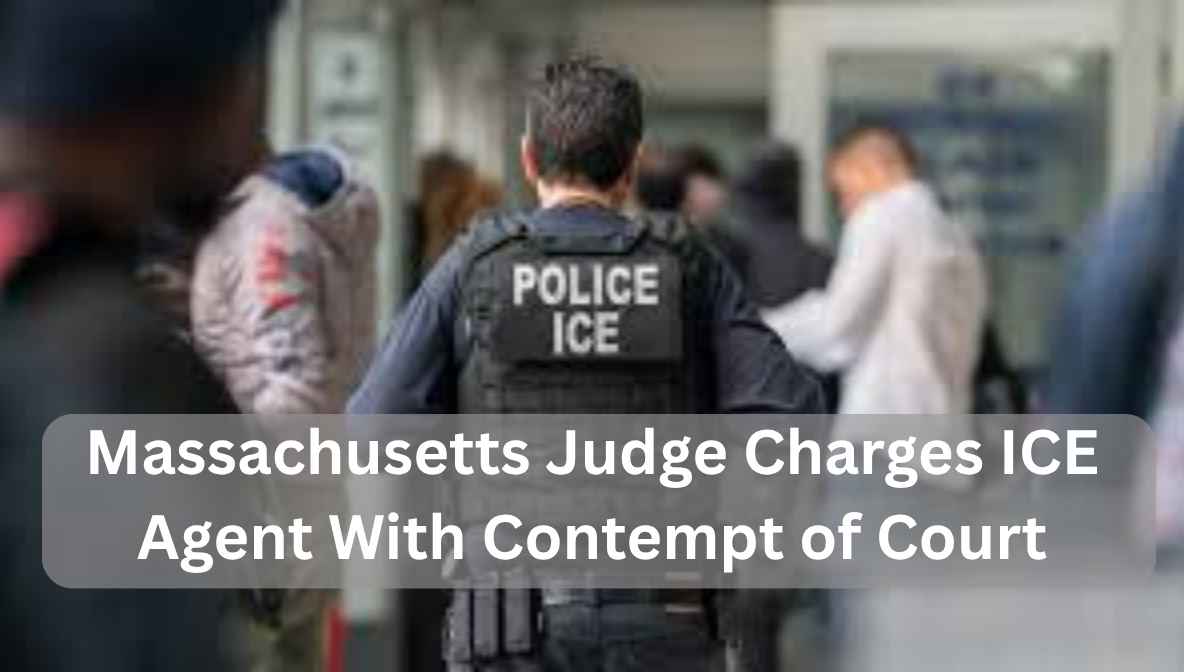Recent fighting in a courtroom has caught the attention of many in the legal profession. A Massachusetts judge charges ICE agent with contempt of court, following an incident during a criminal hearing. The judge said the agent ignored a direct command and tried to keep the defendant within the court building. By making this ruling, the judge reflects the conflicts continue to exist between federal immigration enforcement and local courts. Certain people think it is needed to preserve judicial integrity, while others argue it threatens the nation’s future.
This story describes what happened in the meeting, the reasons the Justice Department believes the speaker was in contempt, and how this event involves disputes between federal and state authorities.
Key Points:
- ICE attempted to arrest a person who had obeyed the judge’s order.
- The judge placed a contempt charge to support the authority of the court.
- It demonstrates the conflict between state and federal powers.
What Makes the Massachusetts Judge Accuse the ICE Agent of Contempt?
The problem started when a criminal case was heard in a Massachusetts state court. It was made very clear by the judge that no arrests ought to take place inside the courtroom. Regardless of this, the ICE agent attempted to arrest a person who was charged with a crime. The judge viewed it as a direct breach of what the court decided.
Contempt of court is acting in a way that shows disregard for the court’s authority. The charge can be used by judges if a person violates an authorized command. Here, the judge decided that the ICE agent’s conduct negatively affected the court’s process.
In 2019, New York had another case where this occurred. Local rules were not followed when an ICE officer arrested someone at a courthouse. Even though there was a lot of debate about the case, law enforcement chose not to file any contempt charges.
Respect any court orders you are given to safely avoid problems with the law.
This example makes it clear that federal agents creating conflicts are likely when they operate without talking to local courts. Settling the charges against the agent as contempt was meant to show everyone that the rules in court must be obeyed.
Under Which Circumstances Does Contempt Of Court Apply?
Contempt of court allows judges to manage and control what happens in court. They can be divided into civil and criminal law. Civil contempt generally happens when someone unlawfully does not obey a court order such as not paying required child support. Doing things that disturb meetings in court or act in a disrespectful manner is considered criminal contempt.
Here, the Massachusetts judge charges ICE agent with contempt of court based on criminal grounds. The agent ignored an order from the court which disrupted the proceedings and put due process at risk.
Civil vs. Criminal Contempt
| Type of Contempt | Description | Possible Penalties |
|---|---|---|
| Civil Contempt | Disobeying a court order | Fines, jail until compliance |
| Criminal Contempt | Disrupting or disobeying a court | Fines, set a jail term |
When working in state buildings, federal agents need to follow the set rules of the local court. In the judge’s view, the agent’s choice went far beyond what was allowed.
Court orders are meant for all individuals, not just for federal officials.
This charge expresses that courtroom officials are not influenced by anybody besides the law.
Where Do State And Federal Authorities Run Into Problems When Making Immigration Laws?
Although ICE is a federal agency, most states have created restrictions that stop local governments from cooperating with it. Massachusetts is among the states in that category. The clash occurs if federal agents come into state courts and disregard local court procedures.
In this case, the Massachusetts judge charges ICE agent with contempt of court because the agent ignored the court’s procedure. ICE conducts immigration work; however, they cannot violate local laws.
Federal vs. State Authority on Immigration
| Authority | Federal Responsibilities | State Responsibilities |
|---|---|---|
| Law Creation | Makes and enforces immigration laws | Cannot create immigration laws |
| Law Enforcement | Runs ICE and Border Patrol | Can limit cooperation with immigration agents |
| Legal Boundaries | Must follow constitutional rights | Can challenge unlawful enforcement practices |
Courts have decided that ICE detainers must be accompanied by a warrant. Sometimes, state judges will not cooperate if the necessary paperwork is not presented. These steps secure defendants’ rights and make sure there is a fair trial.
Such a case is connected to talks around immigration and the independence of the states.
What Happens To the ICE Agent Legally?
Once the Massachusetts judge charges ICE agent with contempt of court, the legal process begins. The agent might need to go to court to explain their choices. Several consequences may be given if the judge finds him guilty.
For example:
- Fines: The court has the power to impose fines.
- Jail Time: Sometimes, a contempt case will result in being sent to jail for a short period of time.
- Career Effects: Agents’ actions in a case can shape what happens in their ICE careers.
The action of the agent may be defended by federal officials who say duty required the action. Following federal laws does not allow someone to break court orders. People working for the federal government have previously faced charges of contempt.
The outcome should serve as a reminder for others. It serves to alert all agents that respecting court rules is necessary, no matter what their level of government is.
How Will This Case Change the Way ICE Works in the Future?
The fact that a Massachusetts judge charges ICE agent with contempt of court could change how ICE works in state buildings. Judges might begin introducing stricter limits. ICE could decide not to intervene with arrests inside the courts.
Possible changes are:
- New Court Protocols: Agents may be told by judges not to operate in certain parts of the court.
- ICE Policy Revisions: Policies at ICE might be changed to prevent legal difficulties.
- Legal Challenges: There may be more lawsuits about the way enforcement takes place.
If the contempt charge succeeds, other judges may believe it is their right to act similarly. ICE could decide to keep a distance by using monitoring instead of accessing court locations.
Legislators may be encouraged to seek clearer guidelines for courts and ICE to follow because of this legal situation.
Conclusion
When a Massachusetts judge charges ICE agent with contempt of court, it sends a strong message. Federal agents in the courtroom are subject to the same rules as others. This case covers more than one event. It points to problems concerning power, handling of law and how courts are respected.
Judges are allowed to keep order in the courtroom. Not following the instructions of the court harms the system of justice. There is a chance that this case results in countries working more closely, offering more clarity and caring more about obeying the law.
FAQ’s
1. What does it mean when a Massachusetts judge charges ICE agent with contempt of court?
A court gave a direct order to the agent that was not followed during the legal hearing.
2. Can an individual judge take action against an agent from the FBI for contempt?
Yes, if the agent breaks the rules set by the court while working in that area.
3. What sanctions may apply to someone who is charged with contempt?
A person might face fines, time in jail, or disciplinary action in their career.
4. Are there any rules requiring ICE to ask for permission before entering state courts?
They should obey court regulations and might have to get warrants to work in court buildings.
5. How could this influence the way ICE is run from now on?
Possibly. ICE can change its actions to stay out of legal problems with local courts.

